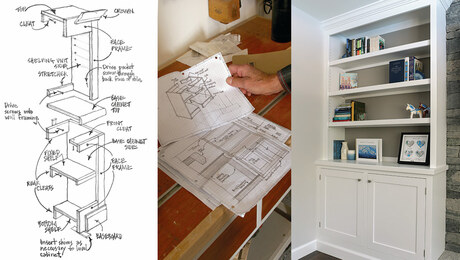I am considering replacing older gavanized pipe in my home plumbing system with copper tubing.
Currently, the electrical breaker panel is grounded to the metal plumbing as well as to a ground rod external to the house.
A If I join the copper tubing to galvanized pipe, using a dielectric union, as recommended to reduce corrosion, my copper distribution system will essentially be ungrounded, right?
B Would the dielectric union be made useless if I put a bond wire to join both sides of the union?
C Is it necessary or suggested to run a ground cable directly from the breaker box where the galvanized pipe enters the home in the basement?
D Is grounding to the metal underground pipe, which is not being replaced at this time, unnecessary due to the electrical isolation of the rest of the water supply system in the house, and the presence of a separate ground rod?
In advance, thank you for any advice that you can provide. Randy















Replies
"C Is it necessary or suggested to run a ground cable directly from the breaker box where the galvanized pipe enters the home in the basement?
D Is grounding to the metal underground pipe, which is not being replaced at this time, unnecessary due to the electrical isolation of the rest of the water supply system in the house, and the presence of a separate ground rod?"
There are several different grounding electrode systems, but common in homes includes BOTH a ground rod AND metalic water pipe that extends at least 10 ft in the ground. For that combination, both are needed.
The connection to the water pipe needs to be made within 5ft of where it comes into the house.
Also you want to put a jumper around the dielectric union so that the coper pipe is bonded.
From my understanding the problem with galvanic corrosion is on the side where you have the disimilar metal along with the water to complete the path of the "battery".
I know that I worked on some copper pipe that had been connected to galvanized without a dielect. It looked perfect on the exterior, but the interior of the galvanized was trashed.
Bill,
Thank you for the information. One of the reasons that I want to replace the galvanized is that currently there is some copper tubing connected to the galvanized main pipes without a dielectric union, and I think it is deteriorating the galvanized, as I see alot of visible rust when I turn on water for laundry in the evening.
I live in a 1-story ranch-style house, and all of the water pipe is easily reached for repair/replacement. I just want to do it right and safely.
Randy
"I think it is deteriorating the galvanized, as I see alot of visible rust when I turn on water for laundry in the evening."On the that I replaced there was a real mix of copper/galvanized. One place they used a dielectric and another they did not. There where several others, but they where all getting ripped out and replaced anyway.That left not water riser to the bath basin and cold risers to the basin and toliet. On the cold water side it was all galvanized. And very clean for being 50 yo. Did not have any problems unscrewing it or connecting up to the new copper with a dielectric.The hot water side they just had a coppere nipple screwed into the galvanized elbow and then the riser.Replaced it with a dielectric union and it leaked at the elbow. Tighten it some more and the elbow cracked. Long story short the elbow and riser where all corroded and full of Junk. Fortunately it was a short riser in 6" wet wall. Chopped the h*ll out of the subfloor and was able to work and wiggle the riser and stub out of the wall from below and replace it with same in copper.
Elbows are the first to go, particularly on the hot water side. Something about the force of the water as it changes direction.
If the ground is on the earth side of the union, why do you need to jumper the union? Is this something about grounding the water pipe as opposed to grounding the electrical system?
All substantial metal structures in the house should be "bonded" together and to the electrical ground. (Not sure what the legal p's and q's are, but basically by "substantial" I mean any system that extends more than about 10 feet, especially a system that covers multiple rooms.) This protects you should a hot wire somehow come in contact with the pipes (or other structure). It also assures (especially in a retrofit situation) that any "bootleg" grounds to water pipes are made good. Finally, it provides some inhabitant protection against lightning.
I tried a dielectric union once. It didn't help much, only lasted about 5 years before the galvanized crapped out. If you do a re-pipe, do it right, do it all. Of course it may vary based on local water chemistry.
-- J.S.